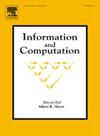Homogeneous spiking neural P systems with synaptic failure
IF 0.8
4区 计算机科学
Q3 COMPUTER SCIENCE, THEORY & METHODS
引用次数: 0
Abstract
Spiking neural P (SN P) systems are a class of neural-like computational models, inspired by the way biological neurons process information through electrical impulses known as spikes. Homogeneous spiking neural P (HSN P) systems are a specialized variant of SN P systems, where all neurons share the same set of rules. In this work, with the biological inspiration that excessive synaptic transmission can lead to short-term failures in signal delivery between neurons in neural systems, the notion of synaptic failure is considered in HSN P systems, termed HSN P systems with synaptic failure (HSNPSF systems). Specifically, synaptic failure is referred to a family of sets of failure-prone synapses: if spikes simultaneously pass along all the synapses in such a set, the transmitted spikes across the synapses are suppressed; if a synapse in the set does not transmit any spike, the spikes pass along the synapses at that time, ultimately reaching the destination neurons. The computational power of HSNPSF systems is investigated by proving that they can achieve computational completeness both in generating and accepting modes. Furthermore, the computational efficiency of HSNPSF systems is examined, and it is demonstrated that with the help of non-deterministic feature, these systems are capable of solving NP-complete (the Subset Sum) problem in a semi-uniform way and within constant time.
具有突触失效的均匀脉冲神经系统
脉冲神经P (snp)系统是一类类似神经的计算模型,其灵感来自于生物神经元通过被称为脉冲的电脉冲处理信息的方式。同质脉冲神经系统(HSN - P)是snp系统的一种特殊变体,其中所有神经元共享同一套规则。在这项工作中,生物学上的启发是过度的突触传递会导致神经系统中神经元之间信号传递的短期失败,在HSN - P系统中考虑了突触失败的概念,称为具有突触失败的HSN - P系统(HSNPSF系统)。具体来说,突触失效指的是一组易发生故障的突触:如果脉冲信号同时通过这样一组突触中的所有突触,则传递的脉冲信号在突触间被抑制;如果集合中的一个突触没有传递任何尖峰信号,那么尖峰信号就会沿着此时的突触传递,最终到达目标神经元。研究了HSNPSF系统的计算能力,证明了HSNPSF系统在产生模式和接受模式下都能实现计算完备性。在此基础上,分析了HSNPSF系统的计算效率,证明了在非确定性特征的帮助下,HSNPSF系统能够在恒定时间内以半均匀的方式解决np完全问题(子集和)。
本文章由计算机程序翻译,如有差异,请以英文原文为准。
求助全文
约1分钟内获得全文
求助全文
来源期刊

Information and Computation
工程技术-计算机:理论方法
CiteScore
2.30
自引率
0.00%
发文量
119
审稿时长
140 days
期刊介绍:
Information and Computation welcomes original papers in all areas of theoretical computer science and computational applications of information theory. Survey articles of exceptional quality will also be considered. Particularly welcome are papers contributing new results in active theoretical areas such as
-Biological computation and computational biology-
Computational complexity-
Computer theorem-proving-
Concurrency and distributed process theory-
Cryptographic theory-
Data base theory-
Decision problems in logic-
Design and analysis of algorithms-
Discrete optimization and mathematical programming-
Inductive inference and learning theory-
Logic & constraint programming-
Program verification & model checking-
Probabilistic & Quantum computation-
Semantics of programming languages-
Symbolic computation, lambda calculus, and rewriting systems-
Types and typechecking
 求助内容:
求助内容: 应助结果提醒方式:
应助结果提醒方式:


